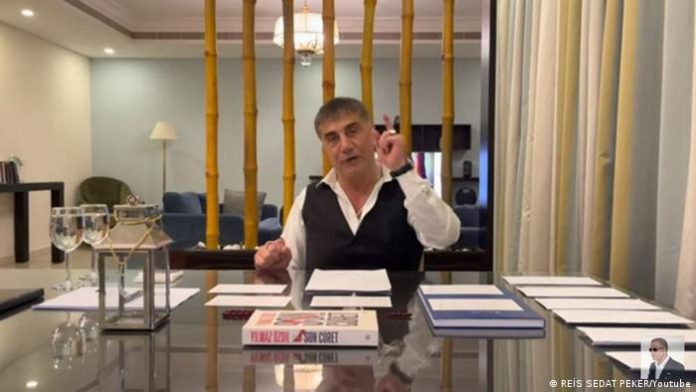When the Turkish parliament meets for the first time after the summer break on October 1, the draft law to combat the spread of misinformation on social media will be at the top of the agenda. According to the government of President Recep Tayyip Erdogan, it should be passed by Parliament as quickly as possible.
Oppositionists and other critics fear that the new law could be misused to suppress freedom of expression and freedom of the press in Turkey, especially before the presidential and parliamentary elections in June 2023. After violent reactions to the draft law, the governing party AKP considered reducing the proposed penalties, which the ultra-nationalist alliance partner MHP continues to insist on.
Why should social media be more strictly controlled?
The idea of introducing a stricter law against disinformation is not new. The revelations by the exiled mafia boss Sedat Peker are currently giving the government reason to pursue the project again. Former Erdogan supporter Peker has been posting videos on YouTube since 2020 in which he accuses several AKP politicians and top officials of corruption and dirty business.
For government critics, Mafia godfather Peker is a credible whistleblower. And he has announced that he will publish further explosive revelations specifically about President Erdogan – two months before the next elections.
Apparently, this makes the governing party very nervous. After further allegations of corruption against several AKP politicians and Erdogan advisors a few weeks ago, the public prosecutor’s office initiated investigations. Two Erdogan advisors, who were also the target of the allegations, quickly resigned – allegedly for health reasons.
MHP boss Devlet Bahceli used the Mafia boss’s revelations as an opportunity to put the disinformation law back on the agenda: “Recent developments have shown that social media need unconditional control,” said Bahceli, calling for the disinformation law to be passed promptly. According to the 74-year-old, this is necessary to prevent attempts at provocation that could aim to influence next year’s elections.
Disinformation or censorship law?
In the course of the Disinformation Act, there would also be changes to the Press Act and the Criminal Code. Should the draft pass as it stands, it would also introduce a new criminal offense known as Section 217/A. He provides a prison sentence of between one and three years for “spreading misinformation about the country’s internal and external security, public order and general health”.

Protest against the “Disinformation Law” in Ankara: “Silence, intimidate, lock up, no to the law! The press is free and cannot be censored!”
What is causing debate inside and outside of Parliament is that the law allows a very wide latitude as to what constitutes “misinformation”. Critics therefore complain that the law is suitable for unduly curtailing freedom of expression and freedom of the press.
The civil initiative “Regulation and Balance Network (DDA)”, which is particularly examining the origin and content of laws, criticizes the draft: “The new regulation introduces a broad and difficult to define type of criminal offense and subjects it to a very strict criminal sanction.” Trade unions and media associations also took to the streets in June and protested against the government’s plan under the motto “No to the censorship law”.
Disinformation law could thwart legitimate concerns
It is also feared that the law could not only punish but also prevent the dissemination of important information and legitimate concerns. As an example, the campaign “Where’s the $128 billion gone?” to serve. Last year, the largest opposition party, the CHP, demanded that the Turkish central bank account for $128 billion that had disappeared from the central bank’s foreign exchange reserves.
The campaign was so successful that the central bank was eventually forced to issue a statement. The AKP, however, had long described the campaign as “disinformation.”
Opposition: a “disaster” for Turkey
MHP MP Feti Yildiz, who submitted the draft to parliament in early summer, defended the law in an interview with DW: Political opponents “wrongly” defamed it as a censorship law. In fact, it does not penalize statements that do not exceed the limits of reporting.

Calls the planned law a “disaster for Turkey”: Özgür Özel, deputy chairman of the largest opposition party, CHP
The opposition parties are demanding that the AKP government involve all those involved in politics and society in the decision-making process. The CHP had already offered this to the government in June, said the deputy CHP chairman Özgür Özel in an interview with DW. He very much regrets that this did not happen.
He also finds it particularly problematic in the current draft that the media would have to disclose their sources if the law were to come into force in this form. It would be a “disaster for Turkey,” said Özel.












